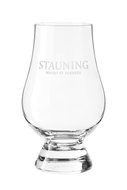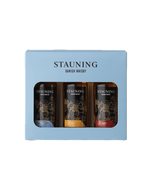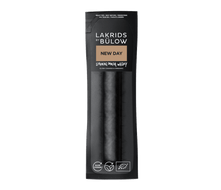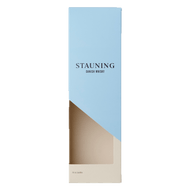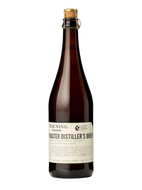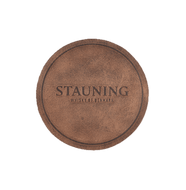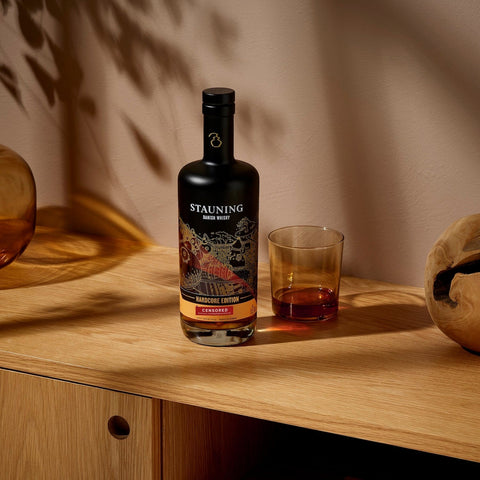The EU Rye Whisky Ban, Explained
The EU Rye Whisky Ban, Explained
This is not an Aprils fool´s prank – though it might seem so: Forgotten EU Agreement Prohibits Danish and European Producers from Calling Their Rye Whisky "Rye Whisky"
A 20-year-old EU agreement makes it non-compliant for European whisky producers to use the term "rye whisky." This affects Denmark's largest distillery, Stauning Whisky, which sells worldwide and won Best Single Cask Rye Whisky at the World Whiskies Awards just last week, something that, under this legislation, will prove challenging in future.
Stauning Whisky has received acclaim for its hyper-local Danish Rye whisky, which is sold to bars, restaurants, and whisky lovers around the world. Now, an old EU agreement with Canada is hindering Stauning and other European distilleries The agreement, signed in 2004, means that European producers are not allowed to call their whiskies "rye whisky". The implications of this agreement has only now come to light, as confirmed by several distilleries across Europe (Kyro from Finland, Storck from Germany, Thy from Denmark, Ruotker’s from Austria - to name a few).
"We are, of course, quite frustrated that a huge mistake has been made in the EU concluding this agreement. Rye, being a raw material used for whiskies in several different countries, should not be trademarked in the EU. Protecting the use of the raw material is a bit like saying that outside of France you can’t use the word 'grape' or 'wine' in your product description," says Alex Munch, CMO and co-founder of Stauning Whisky.

Completely Crazy - Protect the terroir, not the ingredients
The agreement is apparently made to protect Canadian rye whisky, but according to Alex Munch, this could be done with a geographical delimitation, as we see with Champagne and Parmesan cheese.
"It's perfectly fine to protect 'Canadian Rye' – that makes sense. We also dream of protecting 'Danish Whisky' in the future. Typically, you protect a specific production method or the region where it’s produced. But the agreement in its current form doesn’t make any sense," says Munch, who sees this challenge to think creatively and find solutions.
He emphasizes that Stauning will continue to do what has made the West Jutland distillery one of the world's most recognized producers.
"We are recognized for our rye whisky all over the world, and we will continue to make Danish rye whisky exactly as we always have. Even if we eventually have to change the wording on the label, we will never compromise on our way to make whisky or on the quality of the spirit that we deliver to the world," says Alex Munch.

Nobody Knew – Not Even the Canadians
The agreement is more than 20 years old, and no one seems to have been aware of its existence – not producers, the EU, nor even Canada where our Rye Whisky was approved without any issues.
"Nobody was aware of it – and it hasn't been enforced for the last 20 years. We went through a long approval process to get into Canada, and our rye whisky was approved without any problems. In the US market, it is a requirement that we label it as rye whisky. This clearly shows that it is a strange situation," says Alex Munch.

Pressure on the EU when the agreement is renegotiated
Although Stauning is prepared to adapt to the naming restrictions, the distillery is working with the EU to change the agreement when it comes up for renegotiation next year. The current regulation makes little sense and affects all whisky producers in the EU.
"We have always made rye whisky, and rye has been part of Danish food traditions for 2,000 years – so of course, we will continue to do what we do best. That’s why, I urge the Danish government to take up this matter so we can renegotiate this element of the 2004 agreement," says Alex Munch.
There is already political support from several Danish politicians, and multiple producers across Europe will also lobby for changes to the agreement next year. SMV Danmark, the business organization, representing 18,000 small and medium-sized enterprises in Denmark, is also calling for action. They also hope that Danish politicians will work to solve the problem.
"It is our analysis that this rule provides very limited value to Canada while creating an unnecessary obstacle for smaller European producers. Therefore, I expect there will be broad interest in solving the problem," says Kasper Munk Rasmussen, industry manager at SMVdanmark.

A Special “Censored” Whisky Release
Stauning Whisky has also chosen to bottle and sell a very special whisky to highlight the issue. The whisky will be on sale from April 1st.
"We have simply chosen to censor the name of the whisky because it is a rye whisky that bears the name RYE – which under this trade agreement, we are not allowed to call it," says Alex Munch.

“Whisky” and “rye whisky” mean the same thing in Canada
Historically, all whisky was called "rye whisky" in Canada, after they started adjusting the corn-based mash bill with rye back in the 19th century – and whisky was then simply called "rye" in Canada
Therefore, there does not need to be rye in a rye whisky produced in Canada. And the specific rules are:
- Must be mashed, distilled, and aged in Canada
- Must be aged in small wooden containers for at least 3 years
- Must not fall below 40% ABV during production or in the bottle
- May contain caramel coloring
- May include up to 9.09% wine, fortified wine, or whisky (aged at least 2 years) from another country – applicable only to blends
- Must taste like Canadian whisky (as judged by authorities)
There are six different types of Canadian whisky, all of which may be called "rye whisky" on the label:
- Blended Canadian Whisky
- Single Grain Whisky
- Single Malt Whisky
- Cask-Finished Whisky
- Flavored Whisky
- Rye Whisky
The General Perception of Rye Whisky Worldwide (Not in Canada)
Outside Canada, “rye whisky” generally means:
- At least 51% rye in the mash bill
- Distilled below 80% ABV
- Entered into new, charred oak barrels at no more than 62.5% ABV
- Bottled at a minimum of 40% ABV
- Additives allowed only if not labeled “straight rye”




